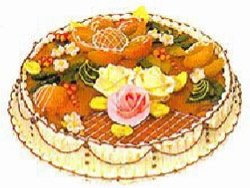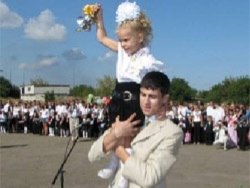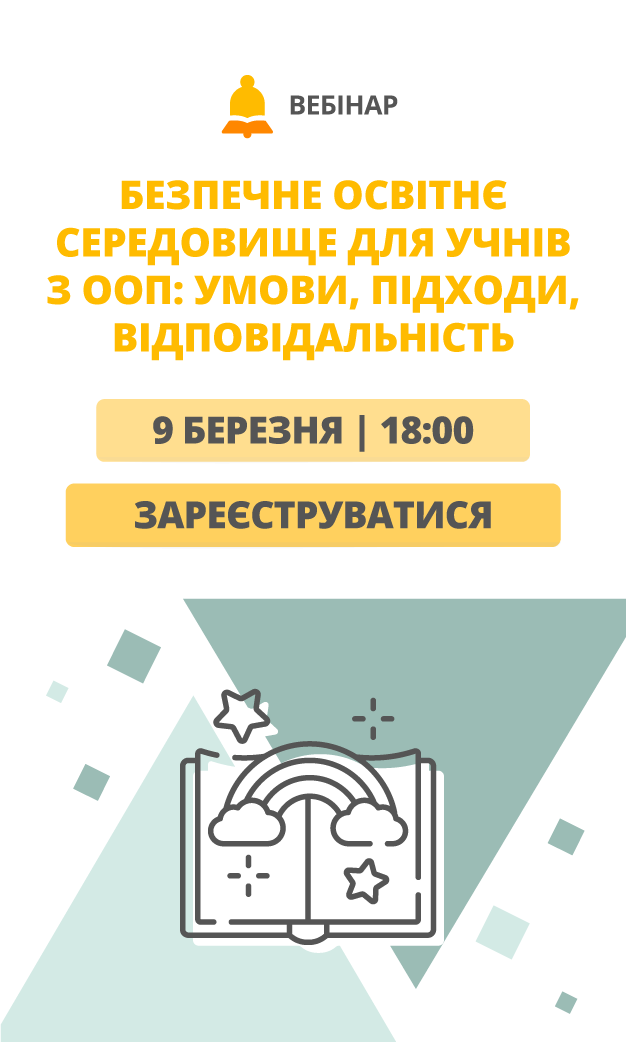Knowledge Day.........................................................................

Ноздрачова Олена,
ЗОШ 11 ,
м.Чернівці
Knowledge Day
The start of September heralds the beginning of a new school year, when millions of children across the country return to the classroom after the summer break. The first day back is known as Knowledge Day often simply called the 1st of September. This day also marks the end of summer and the beginning of autumn.
 Knowledge Day has special significance for the incoming class of first graders who come to school for the first time and often participate in a celebratory assembly on this date. The day starts with the ringing of a bell, when a first-year pupil rings a school bell while being carried on the shoulders of a final-year student. First graders also meet their teachers for the first time and present them with bouquets of flowers . It’s an old custom. On this day one can see plenty of holiday-dressed children carrying beautiful flowers arrangement meant not only for teachers but for their relatives (especially mothers and grandmothers) as well. Parents also try to make this day special for their children and give them small gifts, such as chocolate gifts or sweet gifts and plush toys.
Knowledge Day has special significance for the incoming class of first graders who come to school for the first time and often participate in a celebratory assembly on this date. The day starts with the ringing of a bell, when a first-year pupil rings a school bell while being carried on the shoulders of a final-year student. First graders also meet their teachers for the first time and present them with bouquets of flowers . It’s an old custom. On this day one can see plenty of holiday-dressed children carrying beautiful flowers arrangement meant not only for teachers but for their relatives (especially mothers and grandmothers) as well. Parents also try to make this day special for their children and give them small gifts, such as chocolate gifts or sweet gifts and plush toys.
 Children don’t study on the 1st of September and the whole family usually gathers at a festive table decorated with a beautiful flowers arrangement.
Children don’t study on the 1st of September and the whole family usually gathers at a festive table decorated with a beautiful flowers arrangement.
For first-graders there is a holiday of the First call, and as a whole, a holiday of the beginning of a new academic year, first of all for pupils, students and teachers. Originally the day on September, 1st, already after giving to it of the status of the state holiday, nevertheless was in the educational afternoon at schools: the holiday at schools began with a solemn ruler, then the World Lesson, then other lessons were conducted. Now solemn rulers (when pupils of schools are built in a line according to the class) and other celebratory actions on which the special attention is given to first-graders are spent only at schools. Special and higher educational institutions, as a rule, do without rulers (for first-year students the solemn meeting is held, but pupils of older years study), but the solemnity of the moment from it doesn't decrease. On September, 1st pupils and their parents give to teachers flowers, congratulate on the beginning of academic year. The first persons of the state traditionally congratulate on Day of knowledge of teachers and pupils. Various educational institutions are visited by administration of areas, heads of cities and the country.
If someone dear to you is a teacher, a pupil or has children studying at school, you shouldn’t miss the opportunity to make a nice surprise, congratulate them on Knowledge Day and send a wonderful bouquet of flowers complimented with a delicious cake to your country!
1st September – The Day of Knowledge in Ukraine
 On the 1st of September students and teachers celebrate the Day of Knowledge. On this day bells are ringing in every school, college, institute, university, announcing about the beginning of a school year. It is a serious holiday for all children, but especially exciting it is for little kids, who are going to spend their first day at school. Meetings with friends and teachers, lots of flowers, festive and solemn speeches and the ringing of the first school bell make this day unforgettable and enjoyable for all. After a fun filled hot summer students are going back to the “Land of Knowledge”. You’ll see many nicely dressed students and their parents carrying flowers everywhere. The day starts with meetings called “The First Bell” held next to each school. Traditionally at the end of such meetings one of the smallest students rings the symbolic school bell. The school year has begun. The first lesson, which is conducted in Ukrainian schools is called a Peace Lesson. This day is also called the “Day of Open Doors”. This is a special day, when educational institutions welcoming many guests and introducing their facilities.
On the 1st of September students and teachers celebrate the Day of Knowledge. On this day bells are ringing in every school, college, institute, university, announcing about the beginning of a school year. It is a serious holiday for all children, but especially exciting it is for little kids, who are going to spend their first day at school. Meetings with friends and teachers, lots of flowers, festive and solemn speeches and the ringing of the first school bell make this day unforgettable and enjoyable for all. After a fun filled hot summer students are going back to the “Land of Knowledge”. You’ll see many nicely dressed students and their parents carrying flowers everywhere. The day starts with meetings called “The First Bell” held next to each school. Traditionally at the end of such meetings one of the smallest students rings the symbolic school bell. The school year has begun. The first lesson, which is conducted in Ukrainian schools is called a Peace Lesson. This day is also called the “Day of Open Doors”. This is a special day, when educational institutions welcoming many guests and introducing their facilities.
 I
I
My child and I hold hands on the way to school,
And when I leave him at the first-grade door
He cries a little but is brave; he does
Let go. My selfish tears remind me how
I cried before that door a life ago.
Each fall the children must endure together
What every child also endures alone:
Learning the alphabet, the integers,
Three dozen bits and pieces of a stuff
So arbitrary, so peremptory,
That worlds invisible and visible
Bow down before it, as in Joseph's dream
The sheaves bowed down and then the stars bowed down
Before the dreaming of a little boy.
That dream got him such hatred of his brothers
As cost the greater part of life to mend,
And yet great kindness came of it in the end.
II
A school is where they grind the grain of thought,
And grind the children who must mind the thought
It may be those two grindings are but one,
As from the alphabet come Shakespeare's Plays,
As from the integers comes Euler's Law,
As from the whole, inseparably, the lives,
The shrunken lives that have not been set free
By law or by poetic phantasy.
But may they be. My child has disappeared
Behind the schoolroom door. And should I live
To see his coming forth, a life away,
I know my hope, but do not know its form
Nor hope to know it. May the fathers he finds
Among his teachers have a care of him
More than his father could. How that will look
I do not know, I do not need to know.
Even our tears belong to ritual.
But may great kindness come of it in the end.
For first-graders is a holiday of the First call, and as a whole, a holiday of the beginning of new academic year, first of all for pupils, pupils, students, teachers and teachers. Originally day on September, 1st, already after giving to it of the status of the state holiday, nevertheless was in the educational afternoon at schools: the holiday at schools began with a solemn ruler, then the World Lesson, then other lessons was conducted. Now at schools solemn rulers (when pupils of schools are built in a line according to the class) and other celebratory actions on which the special attention is given to first-graders are spent only. In average special and higher educational institutions, as a rule, does without rulers (for first-year students the solemn meeting is held, but pupils of older years study), but the solemnity of the moment from it doesn't decrease. On September, 1st pupils and their parents give to teachers flowers, congratulate on the beginning of academic year. The first persons of the state traditionally congratulate on Day of knowledge of teachers and pupils. Various educational institutions are visited by administration of areas, heads of cities and the country.
Розгорнутий план-КОНСПЕКТ УРОКУ
Тема: Are You Glad to be Back to School?
Report structures: 'that clauses' (непряма мова: додаткові підрядні речення).
Цілі та завдання:
- Пізнавальний аспект - знайомство зі способом життя і рисами характеру британських учнів, з їх ставленням до навчання і закінчення канікул.
- Розвиваючий аспект - розвиток здібностей до здогаду, до порівняння і зіставлення, до виявлення причинно-наслідкових зв'язків у тексті, до формулювання висновків з прочитаного.
- Виховний аспект - формування потреби, здібності до усвідомлення способу життя, поведінки людей іншої культури.
- Навчальний аспект - введення нових лексичних одиниць за темою, робота над діалогами (читання, переклад), тренування монологічного і діалогічного мовлення за темою уроку, введення нової граматичної теми.
Лексичний матеріал-favorite subject, to be glad, to be sorry, summer break, interesting activities.
Види мовленнєвої діяльності: аудіювання, монологічна, діалогічна мова, читання.
Обладнання: SB, WB, касета, малюнки та схеми.
План
- Організаційний момент
- Фонетична зарядка
- Мовна зарядка
- Работа по темі уроку
- Пояснення домашнього завдання
- Подведеніе підсумків уроку.
Хід уроку.
1.Організаціонний момент. Учитель входить до класу, вітається з учнями і просить їх сісти. Далі коротко розповідає, ніж клас буде займатися протягом наступних 40 хвилин. Організаційний момент займає 2-3 хвилини.
T-r: Good morning guys! How are you?
P-ls: Good morning! We are fine! And what about you?
T-r: I'm fine too. Who is on duty today? Tell us please who is absent?
P-l: Saenko is absent.
Tr: So guys, today we are going to train [d] sound, then focus on listening and some exercises concerning the theme of the lesson.
2.Фонетична зарядка. Учитель роздає аркуші з невеликим віршем, призначеним для тренування фонетики. Один раз прочитує сам, щоб діти могли вловити інтонацію і особливості вимови деяких слів, потім просить учнів прочитати даний вірш в режимі P1>
P2. Фонетична зарядка займає 5 хвилин.
Tr: Отже, ми починаємо наш урок з проведення фонетичної зарядки. Сьогодні ми повторимо звук [d].
T-r: Please, repeat after me
Come to dinner,
Come to dinner!
Ding-dong-dell!
Ding-dong-dell!Soap, meat and potatoes,
Soap, meat and potatoes,
Ding-dong-dell!
P-l 1:
Come to dinner,
Come to dinner!
Ding-dong-dell!
Ding-dong-dell!
Soap, meat and potatoes,
Soap, meat and potatoes,
Ding-dong-dell!
T-r: Very good. Il'ya continue please.
P-l 2:
Come to dinner,
Come to dinner!
Ding-dong-dell!
Ding-dong-dell!
Soap, meat and potatoes,
Soap, meat and potatoes,
Ding-dong-dell!
Tr: Very good, but at the end of the words "Ding-dong" [] sound should be pronounced, like [d].
Serezha, proceed please.
P-l 3: ...
T-r: Thank you! It was very good! You hadn't the home tusk, because last time you presented your project "My favourite subject", am I right, Denis?
P-l 4: You are quite right!
Tr: So let's start a new lesson under the title "Are you glad to be back at school". Tell me please how the title should be translated?
Pl 5: Раді ви повернутися в школу?
Pl 6: Ви раді знову бути в школі?
T-r: Both variants are absolutely right. Before doing focus on listening let's answer some questions.
3.Мовна зарядка. Під час мовної зарядки учитель задає декілька питань, що підводять учнів до майбутньої теми уроку. Питання повинні бути нескладними і припускати проста відповідь. Тривалість зарядки 3-4 хвилини.
T-r: Are you glad to be back at school? Why?
P-l1: Of course, I'm glad to be back. I'll see my friends every day!
P-l2: Oh, no! I'm not! I'll have to do my home work again! It's boring!
T-r: O.K. Thank you for your true answers. Now I'll ask you another question. Do you have any favourite subjects at school? What are they?
P-l 1: Yes, I do. I like Biology and Geography.
P-l 2: As for me, I prefer Literature and Art.
T-r: Very good. Serezha, tell us, please, do you have any favourite subjects at school?
P-l 3: Yes, I have. I like our English lessons very much.
T-r: Really? I'll try to believe you! Thank you for your work, guys. Now we are going to do focus on listening
4.Робота за темою уроку:
1) Аудіювання. (Під час аудіювання вчитель дає прослухати запис двічі, а потім просить відповісти на питання: «Чи раді учасники діалогу поверненню в школу?». Відповідь має бути побудована відповідно до структури, намальованої учителем на дошці. Структура відповіді пишеться учителем на дошці після того, як діти прослухали запис один раз, щоб не відволікати увагу учнів від слухання. Тривалість аудіювання 5-8 хвилин).
Tr: Listen to the tape and answer the question 'Are you glad to be back at school'? What do Mandy, Robert and John say?
(Учні слухають запис)
Tr: You have heard the tape twice and now answer the question according to the example written by me on the blackboard.
Example: John
Mandy says that .............
Robert
Pl 1: John says that he is not glad to be back to school.
T-r: That's right. Kate, go on.
Pl 2: Mandy says that she is glad to be back to school.
T-r: Right you are. Serezha, the last sentence is for you.
Pl 3: Robert says that he is looking forward to school.
T-r: That's right.
Тепер давайте знову подивимося на приклад, написаний на дошці. Як ми в українській мові називаємо речення зі сполучником що?
P-s: складнопідрядними!
T-r: Правильно! А полягає складнопідрядне речення з головного і підрядного . Як ви вже здогадалися сьогодні тема нашого уроку підрядне речення в англійській мові.
Робота над граматикою в комплексі з роботою над діалогами
(Діалоги містять в собі інформацію, яку у відповіді на питання потрібно висловлювати підрядним реченням. Учитель пояснює учням структуру додаткового підрядного сполучника, далі учні читають діалоги, в яких британські діти висловлюють свою думку з приводу повернення в школу після канікул. Після прочитання діалогів учні відповідають на питання у формі підрядного речення).
Пояснення нової граматичної структури
(Для наочності вчитель малює структуру сполучника на дошці у вигляді схеми, що значно покращує засвоєння. Далі учні читають діалоги і відповідають на питання до них. Відповідь повинна будуватися згідно пояснене структурі. Тривалість роботи 17-20 хвилин).
T-r: Коли ми хочемо передати те, що хтось говорить, ми використовуємо дієслово say і підрядне додаткове речення з союзом that.
E.g. John.: 'I am looking forward to school.'
John says that he is looking forward to school.
Джон каже, що він з задоволенням очікує занять в школі.
А тепер подивіться на дошку. На дошці намальована схема підрядного речення. Як ви думаєте, що позначає квадратик з буквою «П» по середині?
Pl 1: Я думаю, що це підмет.
Pl 1: Я думаю, що це підмет.
T-r: Ksenya, you are absolutely right. А дві рисочки - це присудок.
Pl 1:, А чому John сказав says, не say?
T-r: Хлопці, поясніть Денису, чому ми повинні говорити "he says", а не "he say".
Pl 2: Тому що Джон - підмет, виражений іменником в 3-м особі однини, а ми знаємо, що в такому випадку до дієслова в Present Simple додається закінчення-s.
T-r: You are quite right! Більше немає питань?
P-ls: Ні.
T-r: O.k. Open you books on page 11 and let's do exercise 2. Ilya, read the task, please.
Pl 2: These pupils are also sharing their feelings about the first day at school. What are their feelings like? What do they say? Finish up their thoughts?
T-r: Denis, start reading the first sentence.
P-l3: We've had a long summer break. I'm quite glad that the holidays are over.
T-r: That's right. Yana, go on, please.
P-l4: We've just moved, and I'm staring a new school. I'm worried that I won't have friends there.
T-r: Right you are. Olga, go on.
P-l5: Last term two girls teased me for no reason. I'm a bit nervous that they may bully me again.
T-r: Thank you!
Ви відмінно впоралися з вправою, видно, що граматична тема вам ясна. Є ще якісь питання?
P-ls: Ні, все зрозуміло.
T-r: Добре. До дзвінка залишилося 5 хвилин, давайте запишемо домашнє завдання.
5.Пояснення домашнього завдання:
T-r: For the next lesson you have to make the following task:
You should read the text on page 12, translate it and do all the exercises. The exercise 3 should be done in writing. Moreover you should learn by heart the poem on page 14.
Не переплутайте! Текст не з підручника, а з книги для читання!
6.Підведення підсумків уроку. Учитель виставляє оцінки, прощається з учнями, просить їх стерти з дошки і провітрити кабінет. (4 хвилини)
Tr:. Thank you for your work, guys. Don't forget to clean the blackboard and air the classroom!
You may be free. Good bye!
P-ls: Good bye!


про публікацію авторської розробки
Додати розробку
